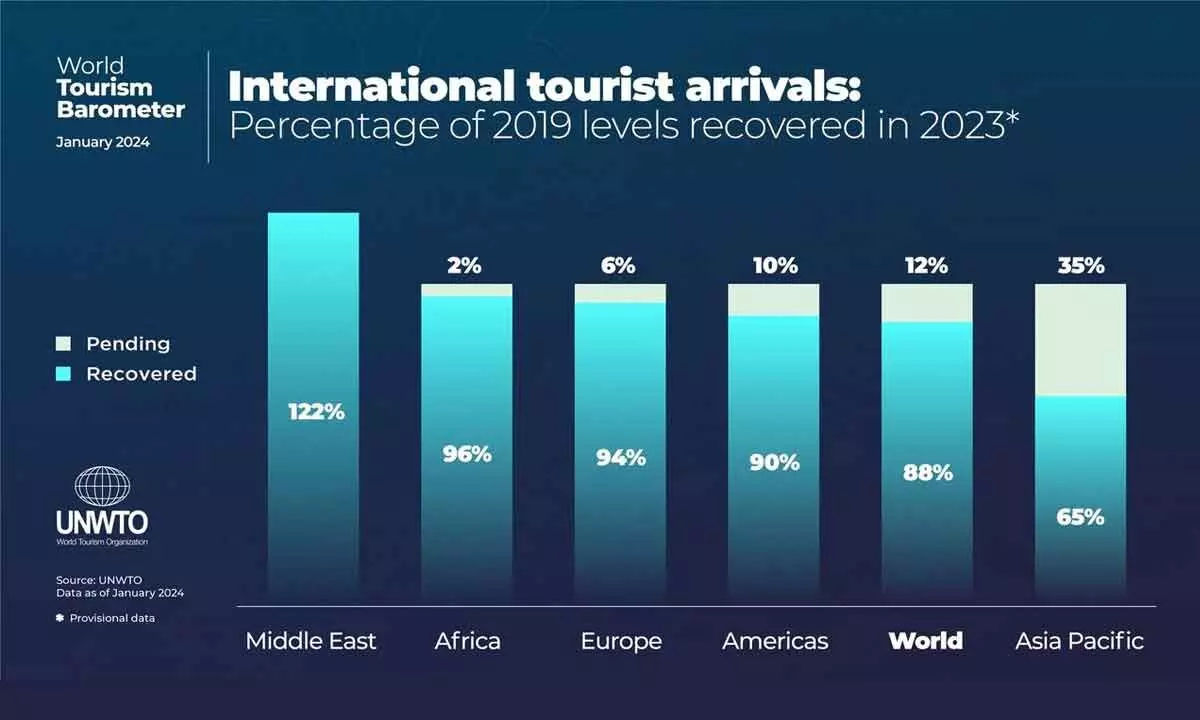The future of business, hospitality and entertainment sectors remains healthy
Latest UNTWO data indicates that tourism figures are heading in the right direction
image for illustrative purpose

Global Market Estimates predict that between 2021 and 2026, the niche will rise at a compound annual growth rate (CAGR) of approximately 10%. Robots are also making inroads into the hospitality industry in automating housekeeping tasks, food delivery, and concierge services
Along with the overall economy, the global hospitality industry has enjoyed a spurt of massive growth over the last decade since the end of the financial crisis. According to the World Bank, the global economy has grown at a pace of more than three percent per year up until the global pandemic hit in 2019/20. Due to pent up demand during the beginning of the Covid-19 pandemic, there was an acceleration of the global economy in 2021 of 5.5 per cent growth, however, it is set to decelerate to 4.1 percent in 2022 and 3.2 per cent in 2023, arriving back at pre-pandemic levels.
International arrivals have increased from 900 million to more than 1.3 billion over a span of just ten years.
Not only has this boosted the number of rooms on offer, but has also led to a major contribution of global employment opportunities. Covid-19 had a severe impact and international tourist arrivals according to figures from UNTWO, which after years of steady annual growth saw a staggering -73% drop in arrivals in 2020 and -71% in 2021 due to travel restrictions in response to Covid-19.
New data from UNTWO found that tourism figures are heading in the right direction as an estimated 235 million tourists traveled internationally in the first three months, more than double in the same period of 2022.
The World Travel and Tourism Council (WTTC) names the hospitality industry’s importance as a main driver in global value creation. Recent figures published by the WTTC found that in 2022 the Travel & Tourism sector made a contribution of 7.trillion USD to the global economy, 7.6% of the global GDP and 23% below pre-pandemic levels.
The hospitality and travel industry accounts for one out of every ten employment opportunities. The number of people earning their living in the sector rose to a remarkable 330 million. In 2022, there were 22 million new jobs, representing a 7.9% increase on 2021 and only 11.4% below 2019.
The rise in revenue not only benefits international companies and hotel owners, but also acts as a major factor in job creation for local populations and destinations. As of the latest data, around 173 million people were employed in the hotel and motel industry before the Covid-19 pandemic hit.
The WTTC forecast that there will be an additional 126 million jobs created between now and 2032.
The overall growth in the travel and tourism industry stands at +5.8% vs. overall GDP +2.7%.
According to the Hospitality Global Market Report 2023, the global hospitality market grew from $4,390.59 billion in 2022 to $4,699.57 billion in 2023 at a compound annual growth rate (CAGR) of 7.0%.
This large growth rate is in part the bounce back from global restrictions on travel. The market is expected to continue growing but at a slower rate due to the global economic situation with a Compound Annual Growth Rate (GAGR) of +5,8% forecasted between 2022 and 2032.
The global economy growth has created positive momentum in the sector by contributing to the overall income per capita.
Marriott and Hilton remain the world’s most valuable hospitality brands, valued in 2023 at $53.5B and $37.99B respectively.
Global Market Estimates predict that between 2021 and 2026, the niche will rise at a compound annual growth rate (CAGR) of approximately 10%. Robots are also making inroads into the hospitality industry in automating housekeeping tasks, food delivery, and concierge services. While robots cannot replace humans entirely, they free up hotel staff to focus on higher-level guest relations and contribute to operational efficiency.
In a positive stride towards sustainability and technological innovation, the biophilic-inspired Business Park by BACL promises smart workspaces within a vibrant public realm. Seamlessly blending work and play, the development aims to cater to the diverse needs of businesses and employees, offering a dynamic environment for growth and collaboration.
The project's most exceptional and breathtaking attribute lies in the urban forest, a lush oasis in the centre of the development. This green space will serve as a focal point, seamlessly blending indoor and outdoor spaces throughout the area.
The upcoming metro station in Airport City will provide hassle-free connectivity to the business park from the northern side, ensuring convenient accessibility.
Rao Munukutla, CEO of BACL – a wholly owned subsidiary of Bangalore International Airport Limited (BIAL), spoke about investment in the development of the business park.
“This investment by BACL will propel our vision of transforming the Airport City into a bustling hub for businesses, knowledge-intensive zones, R&D centres and Global Capability Centres. With world-class infrastructure and a focus on sustainability, our goal is to create a thriving environment that nurtures growth, brings in job opportunities and makes a positive socio-economic impact on the region," he said.

